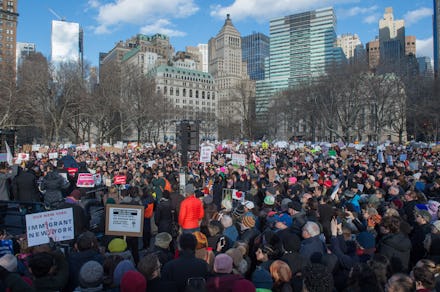Here's how long President Trump's travel ban will last for each country

On Friday, President Donald Trump signed an executive order banning travel from seven predominantly Muslim countries. Under Trump's Muslim ban, refugees from Iran, Iraq, Syria, Sudan, Libya, Yemen and Somalia are barred from entering the United States for at least 120 days. Immigrants and nonimmigrants (visitors) from those countries are unable to enter for 90 days.
The immediacy of the ban took many by surprise, with customs agents in airports around the country unsure of how to process visas and green card holders and the American Civil Liberties Union successfully getting a stay on the executive order.
Green card holders were reportedly duped into giving up their green cards, and people with valid visas who had boarded flights to the United States before Trump signed the executive order were detained, some for hours. In an effort to remedy the chaos, Department of Homeland Security Secretary John Kelly released an order allowing legal permanent residents re-entry back into the United States, arguing it is "in the national interest" and is "absent the receipt of significant derogatory information indicating a serious threat to public safety and welfare."
On Monday, acting Attorney General Sally Yates released a statement to the Department of Justice to not defend the executive order, saying, "I am not convinced that the defense of the executive order is consistent with [her] responsibilities nor am I convinced that the executive order is lawful."
As a result of her order, Yates was immediately fired and replaced, and the White House issued a statement that said Yates had "betrayed the Department of Justice." Following her termination, a video was dug up showing current attorney general nominee Jeff Sessions asking Yates during her confirmation hearing, "if the attorney general has a responsibility to say no to the president if he asks for something that's improper ... If the views the president wants to execute are unlawful, should the attorney general or the deputy attorney general say no?"